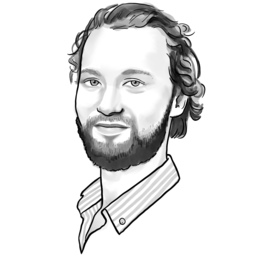
By train or by plane to Brussels? “Train,” KLM boss answers firmly
In the second interview in Room for Discussion’s anniversary series, KLM CEO Marjan Rintel pleads for a global level playing field in the airline industry. That would be a real contribution to sustainability goals, she argues.
Take a seat, get ready for take-off, we are starting in five minutes. The second interview in the anniversary series of Room for Discussion, which is celebrating its 15th anniversary, begins in style. In a pre-recorded video on the panoramic terrace of Schiphol Airport—home of KLM—the two interviewers announce the guest of this sunny Wednesday afternoon: Marjan Rintel, CEO of Royal Dutch Airlines (KLM).
Plane, train, then plane again. This could be the concrete implementation of a somewhat cumbersome itinerary to a warm vacation destination, but no, it is Marjan Rintel's career in a nutshell. These two modes of transportation run like a thread through her life. After positions as vice president of sales and marketing within KLM, she moved on to Dutch Railways (NS), where she spent a year and a half, then served another two years as CEO at the head of the railroad. Then following the costly departure of CEO Pieter Elbers, she returned to KLM.
Better infrastructure needed
Has she completely lost sight of trains since then? By no means, according to her answers. “I think the train and the plane have to work together. If you can go by train for 600, 700 kilometers, you should do it.” But what is needed for that is missing, in Rintel's view. Namely: a solid infrastructure.
“If you want to go to Berlin, it still takes you six and a half hours by train. Had we invested in better infrastructure you could be there in four hours.” The connections between train and plane also fall short, she believes. In a working group with the government and the Dutch National Railway (NS), among others, she is trying to connect them better. “It is difficult to explain to customers from the U.S. that you cannot take the train to Brussels on the weekend, but you can on a Tuesday.”
Meanwhile, the hall in REC-E has filled up considerably. The hall now has about 100 to 150 students, considerably more than at other, recent editions of Room for Discussion. The attendees are also asking good questions, professional questions. About the acquisition of Scandinavian Airlines (SAS), for example. About the investment in aircraft manufacturer Airbus and the purchase of the latest one: the Airbus A350. About the problems at Airbus' competitor, Boeing, and how KLM is dealing with them. But, of course, also about the elephant in the room: sustainability.
Sustainability
Interviewer Koen Blaauw challenges Rintel by mentioning that according to the environmental organization Milieudefensie, KLM is one of the biggest polluters in the Netherlands. When it comes to pollution, Rintel often sticks to her hobbyhorse today: We must create a level playing field for aviation companies so that no unfair competition is created and no environmental problems are passed on to other countries.
A case in point: “You currently pay 60 percent tax on your airline ticket,” says Rintel. “That will increase to 75 because we signed the green deal. If you want to tax even more to become more sustainable, it won't help if you implement that solely at the national level.” Precisely because of that lack of a global level playing field. She would therefore prefer—referring to Qatar Airlines, among others—to see the same rules apply throughout the world. “Only then would it help.”
And if not worldwide, then at least in Europe, she argues. According to her, the European Commissioner for Climate Action, Wopke Hoekstra, is already hard at work on this. “If you then also use that tax increase to invest in sustainability, that's fine,” Rintel says.
She also points to the fact that KLM's planes in Europe usually fly in circles. That, too, has to do with the different rules that apply in (the airspace of) European countries. “Create a single European sky,” Rintel urges. “If we cooperate and optimize in the world, it will contribute 10 percent to CO2 reduction.” A promising appeal, according to interviewer Koen Blaauw.
Finally, she is asked whether she will take the train or the plane to Brussels. The train, she answers adamantly, as she happens to be traveling to the Belgian capital next week. The interviewers are satisfied. “A nice, sustainable note to conclude this interview,” Blaauw observes.

